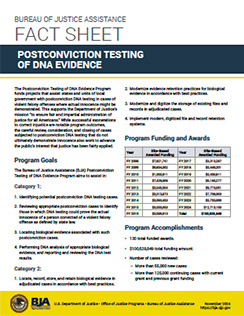The Bureau of Justice Assistance (BJA) administers the Postconviction Testing of DNA Evidence Program funding projects that assist states and units of local government with postconviction DNA testing in cases of violent felony offenses where actual innocence might be demonstrated. This supports the DOJ mission “to ensure fair and impartial administration of justice for all Americans.” While successful exonerations to correct injustice are notable program outcomes, the careful review, consideration, and closing of cases subjected to postconviction DNA testing that do not ultimately demonstrate innocence also work to advance the public’s interest that justice has been fairly applied.
Since the advent of forensic DNA analysis, a growing number of Americans convicted of violent crimes have been exonerated through DNA analysis of evidence that was untested at the time of trial. New technologies have increased the likelihood of successful DNA analysis of aged, degraded, limited, or otherwise compromised biological evidence. As a result, crime scene samples once thought unsuitable for testing may now yield viable DNA profiles. Moreover, samples that had previously generated inconclusive DNA results may be amenable to reanalysis using newer methods.
The National Institute of Justice initiated the program previously titled The Postconviction DNA Testing Assistance Program in fiscal year 2008. The Office of Justice Programs realigned the forensic science capacity enhancement programs in 2020, where BJA took over the administration of all forensic capacity enhancement programs, including the Postconviction program.
The program aims to assist in:
- Identifying potential postconviction DNA testing cases.
- Reviewing appropriate postconviction cases to identify those in which DNA testing could prove the actual innocence of a person convicted of a violent felony offense as defined by state law.
- Locating biological evidence associated with such postconviction cases.
- Performing DNA analysis of appropriate biological evidence and reporting and reviewing of the DNA test results.
Overall, the program has made 117 awards totaling more than $77M to 30 states. The Postconviction program has led to the review of over 170,000 cases and resulted in 59 exonerations over the history of the program.
View the fact sheet to learn more about this program.
View the fact sheet.


